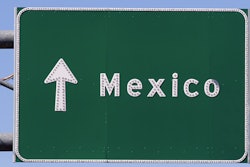
Initial vocal reader reaction was in large part negative to the decision, with concerns over rates and diminished opportunity along the Southern border dominating opinions. “As if freight coming out of Texas wasn’t cheap enough,” wrote Jarrod Porter, responding to Friday’s news on Overdrive‘s Facebook page.
Ben Britton concurred in a sense, noting a belief that U.S. haulers might well say “bye bye” to loads with Laredo destinations long-term.
At once, Canadian hauler Shawn Genge wondered whether all the worry might be a little overblown given Mexico-based carriers, as do Canadian carriers hauling over the Northern border, will have to comply with U.S. trucking regs and “provide the same kind of paperwork you all have to provide on your trucks, and adhere” to all U.S. highway laws.

That fact caused Jeremiah Wenger to look on the bright side: “The good news is the DOT will be busy inspecting their trucks,” perhaps reinforcing a higher cost of operation north of the border.
On the pilot program data issue, operators were less vocal; Padilla stressed to Overdrive that the agency gleaned a “robust set of data” from the program, pointing to the more than 5,500 inspections conducted as evidence. The agency also in the same three-year time span gathered inspection data from 952 Mexican-owned carriers, Padilla says — data also used in the determination to open the DOT’s application process to Mexican-based carriers.
The questions regarding the low number of participants — 15 carriers were admitted to the program, and FMCSA said in 2011 it would need 31-46 to gather enough data — aren’t an issue, Padilla says, as the number of inspections was the primary goal, not the number of participants.
FMCSA projected it would need between 36 and 41 carriers participating in the pilot program to produce the 4,100 inspections, but it reached that number with a lower number of participants, Padilla told Overdrive.
As noted by the OIG, however, 80 percent of inspections conducted in the program were performed on two carriers. And those two carriers accounted for 90 percent of the border crossings made in the program.
However, Padilla notes, 351 of the 952 Mexican carriers studied in conjunction with the pilot program received authority during the three-year period — part of the data used by the agency to make the determination but not studied by the OIG, Padilla says.
Industry groups divided, but watchful
Carrier and owner-driver groups are split on the agency’s decision.
The Owner-Operator Independent Drivers Association says the lack of participation by Mexican carriers in the pilot program shows that Mexican carriers do not want to abide by U.S. safety regulations.
“It’s clear from the lack of participation that Mexico-based motor carriers are not interested in hauling beyond the commercial zone, if it means complying with the same regulations that U.S. truckers do,” says OOIDA’s Todd Spencer. “FMCSA’s persistence to move this program forward is mind-boggling, especially when the agency tells us ad nauseam that their highest priority is safety. Yet this program is all about geo-political economics.”
Teamsters’ head Jim Hoffa says he is “outraged” FMCSA is proceeding with the cross-border expansion, despite the OIG’s findings.
“One thing was made clear in the IG’s report – the pilot program was a failure,” Hoffa said. “It did not provide enough data for the IG to determine with any confidence that the trucks participating in the program were representative of those that could be permitted in the future. Nor could the IG project the safety performance of Mexico-domiciled carriers based on the data collected from the pilot program.”
The American Trucking Associations, however, says it supports the agency’s move to open the border, as long as they apply the same standards U.S. carriers are held to.
“ATA supports border-trucking policy that allows [for] foreign motor carriers wishing to operate in the U.S., provided they comply with all regulatory and financial requirements applicable to U.S. motor carriers,” ATA said in a statement. “Nothing less is acceptable to ATA.”
The Trucking Alliance says it doesn’t have a policy position on the expansion of cross-border trucking, but it too wants to ensure Mexican carriers comply with U.S. regulations: “The Alliance doesn’t have a specific position on Mexican carriers operating in the US, other than making sure these companies undergo the same safety scrutiny as US carriers, such as passing an initial safety review prior to them receiving a DOT number to operate here.”










